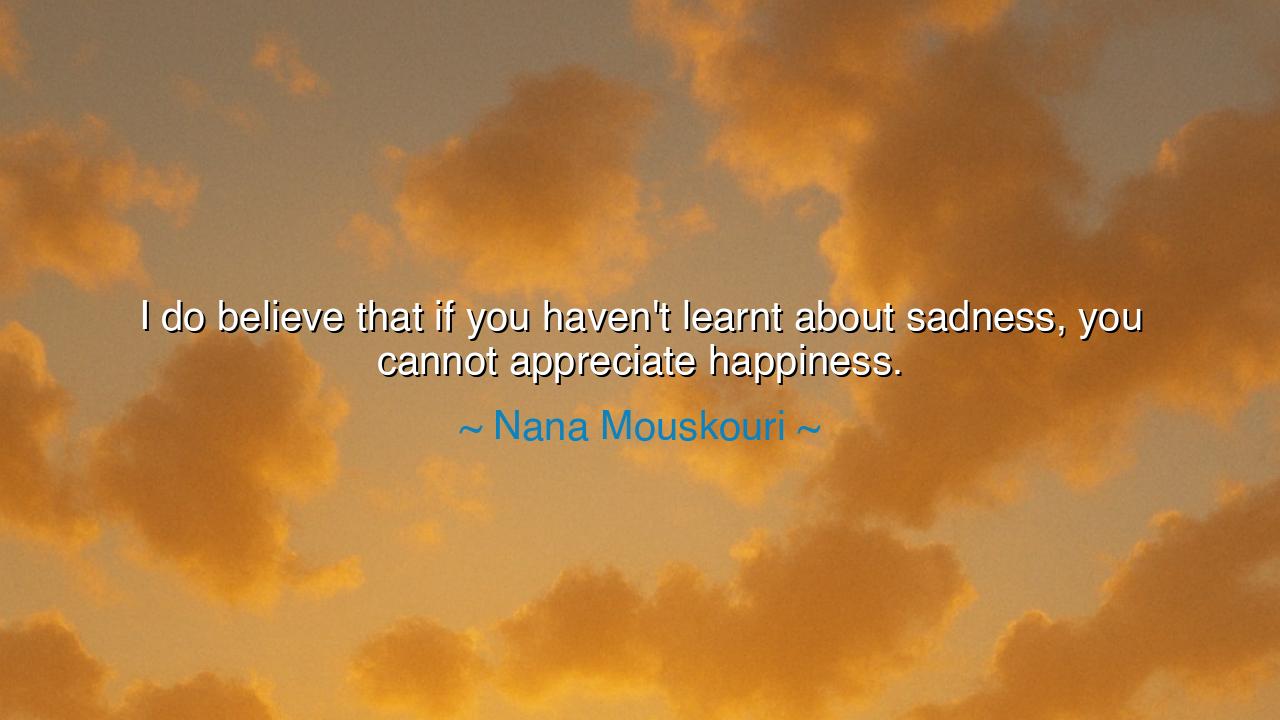
I do believe that if you haven't learnt about sadness, you cannot
I do believe that if you haven't learnt about sadness, you cannot appreciate happiness.






The singer and poet Nana Mouskouri, whose voice carried both the sweetness of joy and the ache of sorrow, once spoke a truth that has echoed through the ages: “I do believe that if you haven’t learnt about sadness, you cannot appreciate happiness.” These are not the words of one untouched by hardship, but of one who has walked through both light and shadow and learned their sacred balance. In this simple yet profound statement lies one of life’s deepest lessons—that sorrow and joy are not enemies, but companions; that to know one without the other is to live only half a life.
Mouskouri’s words arise from the wisdom of experience. Born in Greece during the turmoil of the Second World War, she grew up surrounded by the hardships of occupation and the quiet grief of a people who had lost much. Yet from those ashes emerged her voice—clear, tender, and filled with emotion. Through her songs, she expressed both melancholy and hope, as if to remind us that beauty often blooms from the soil of suffering. Her quote reflects this lifelong understanding: that happiness is not the denial of sadness, but its transcendence. The heart, like a harp, produces its richest music only when it has been tuned by both pain and peace.
This truth is as old as human existence. The ancients understood it well. The philosopher Heraclitus once said, “The way up and the way down are one and the same,” meaning that joy and grief are woven from the same thread of being. Without the darkness of night, the dawn cannot dazzle. Without hunger, food has no flavor. Without loss, love feels weightless. So too with happiness: it shines only because we have known the dimness of despair. Sadness teaches the heart humility, while happiness teaches it gratitude. Each emotion refines the other, shaping the soul into something strong, compassionate, and wise.
History offers many examples of this divine paradox. Consider Helen Keller, who was struck blind and deaf as a child and plunged into an existence of isolation few can imagine. Yet from that darkness, she emerged with a spirit luminous enough to inspire the world. She once said, “Character cannot be developed in ease and quiet. Only through experience of trial and suffering can the soul be strengthened.” Her joy in learning, in touching words with her hands, in finally connecting with the world—was born directly from her earlier anguish. Like Nana Mouskouri, Keller understood that happiness felt deepest when one has first walked through pain.
The quote also reminds us that sadness, though heavy, is not an enemy to be banished, but a teacher to be respected. The ancients saw grief as sacred—a necessary purification of the heart. Just as rain nourishes the earth, sorrow cleanses the soul, making room for new growth. Those who flee from pain often remain shallow in joy, for they have never allowed life to pierce them deeply enough to feel its full range. It is only when we dare to feel our sadness, to weep when the heart demands it, that we clear the space for true happiness to enter. As the poet Kahlil Gibran wrote, “The deeper that sorrow carves into your being, the more joy you can contain.”
Mouskouri’s insight is not merely emotional—it is profoundly spiritual. To learn about sadness is to learn about impermanence, about the fragility of all things. Happiness is precious precisely because it does not last forever. When we embrace this truth, we stop clinging to pleasure and fearing pain. We begin to live in balance, accepting both as sacred movements of life’s rhythm. This is the wisdom of maturity—the peace that comes when one no longer demands that joy be constant, but is instead grateful whenever it visits.
So, my children of the heart, let this teaching settle deep within you: do not curse your sadness, for it is the soil from which your happiness will one day grow. When grief finds you, welcome it as a wise visitor. When joy returns, cherish it with reverence, knowing how fleeting and miraculous it is. Both are gifts from the same source, shaping you into someone fuller, more compassionate, more alive. For as Nana Mouskouri teaches, those who have wept deeply will one day laugh sincerely, and in that laughter will live the memory of all that has been overcome.
Thus, live fully—in both joy and sorrow—and you will discover that happiness is not the absence of sadness, but the harmony between the two. When you learn to see the beauty in your tears, you will find that every heartbreak is only the beginning of a greater love, and every winter of the soul is but a prelude to spring.






AAdministratorAdministrator
Welcome, honored guests. Please leave a comment, we will respond soon